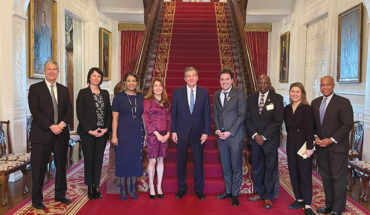by Charles Marshall
photographs by Geoff Wood
Each weekday morning, a veritable supergroup of top local musicians gather in a fabled spot on Glenwood South. But they don’t plug in and jam together. Instead, they disappear into tiny rooms to teach guitar, bass, banjo, even music theory, to students from all walks of life – from high schoolers determined to learn Iron Man to retirees who want to learn to play along with their Beatles collection.
At Harry’s Guitar Shop, teachers and students, fans and rockers, pluckers and singers all have a home. They come to this tiny, cramped hall of rooms to learn, they come to teach, they come to connect.
And they all overflow into the shop itself. Since opening its Glenwood location 25 years ago, Harry’s has functioned more like a community center than a retail store. Today, you may find moms chatting in the store while their daughters finish their lessons, a local musician in need of last-minute repair, or any number of regulars chatting up Harry Tueting. Not long ago, when Glenwood South was not the sleek, upscale urban district that it is today, it was not uncommon to find some of the community’s most downtrodden citizens noodling on a guitar inside the store to pass a small sliver of time.
 Tueting has always wanted his store to double as a “place for artists to make a living in music” through teaching. Having been a performer and teacher himself before he became a store owner, Tueting knows that teaching is often the key to making a budding songwriting or performing career possible.
Tueting has always wanted his store to double as a “place for artists to make a living in music” through teaching. Having been a performer and teacher himself before he became a store owner, Tueting knows that teaching is often the key to making a budding songwriting or performing career possible.
Steve Howell and Jon Heames, who have two of the longest teaching tenures at Harry’s, are living proof of that formula. Howell began working at Tueting’s store when it began as a Raleigh branch of Oxbow Music in 1985. Howell’s now-legendary band, the Backsliders, rose to regional fame in 1992. Heames joined Harry’s staff part-time in 1988 while still playing bass for Let’s Active; his new band, Motocaster, took off around 1993.
After temporary leaves to focus on that success, both were back by the end of the ’90s to build full-time teaching programs during the day, while continuing to write and perform by night. Howell, who believes music is a “social gift” that should be shared with students, customers, and audiences, regardless of age or ability, still plays with a reunited Backsliders and on other projects. And Heames still has a full plate of gigs on the weekends.
They’re not the only ones. Harry’s teacher Scott Miller has played with Kenny Roby; John Whelis was a member the 1970s and ’80s progressive band Glass Moon; and accomplished singer Laurie Capparella also teaches voice lessons.
Teachers of this caliber get results. Heames has students who have ended up in nationally known indie rock bands, the Berklee School of Music, and other prestigious programs. One of Howell’s students forged a career in music ministry and another learned to play the mandolin so well that Howell began asking him to sit in with him at various gigs before he was 18.
Familiar faces
Pee Wee Watson, the current “man at the counter,” has been a fixture at the store for roughly 15 years. Local musicians have known Pee Wee since his stints in regional rock bands Nantucket and PKM decades ago – bands that Howell remembers going to see regularly as a teenager in Eastern North Carolina.
Terry Dineen captains the back counter where he builds and repairs guitars at a dizzying pace. He’s been at it for almost a decade, and he moonlights as a songwriter, engineer, and performer, including a stint in an AC/DC tribute band. Terry’s craft impresses the most seasoned touring professionals, but his easy personality makes the casual players who don’t speak the language of “10s” or “11s,” (as the different gauges of guitar strings are known) just as comfortable.
Teachers flow seamlessly between their offices and the store and often engage with customers on the floor during off-hours – an old habit for some teachers like Howell and Heames who used to double as store employees. Indeed, at times, customers can have trouble telling whether they are talking to a store employee, a teacher on a break, or even an overzealous customer.
While the personalities that forged Harry’s community have remained relatively constant, Tueting is attuned to the changes in the marketplace. He notices many more women in the store now, which he credits, in part, to the steady increase in the number of successful female artists. And the knowledge of his customers about the store’s products has increased tenfold because of the Internet. These trends expand to teaching as well. There has been a noticeable influx of very young girls wanting to learn to sing and play the guitar like Taylor Swift, and students can immediately access songs that they want to learn on You Tube from their mobile phone.
Indeed, Tueting is already well into his second generation of customers, selling guitars to teenagers whose fathers were teenagers when Harry sold them their first guitar.





